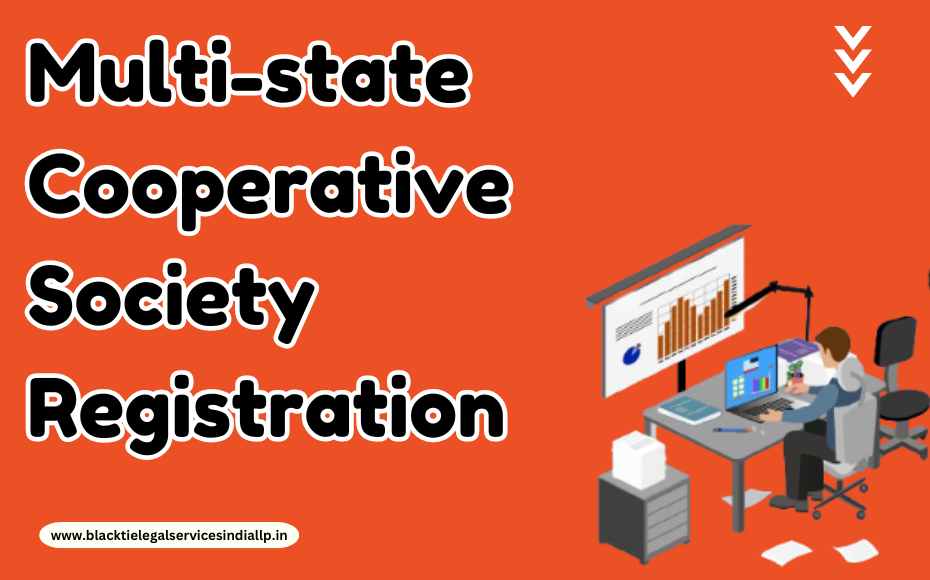Multistate cooperative Society Registration

Multistate Cooperative Society Registration have always been an essential mechanism of mutual cooperation with the aim of self-help organizations of the economic activities of the partners.
An example of this concept is the multi-state co-operative society, which is an extension of co-operative societies operating in at least two states in India. These societies intervene in many areas such as agriculture, credit, housing and consumer sectors.
This guide provided by Blackie Legal Services India LLP is designed to explain the legal requirements, procedural steps and points to note for registering a multi-state co-operative society.

What is Multi state Cooperative Society
Multistate Cooperative Society Registration (MSCS) is a method of company formation for a cooperative body that has got the legal rights to create co-operative societies in different states of India. These are managed under the Multi-State Cooperative Societies Act 2002 and it is mandatory to get itself registered with the Central Registrar of Cooperative Societies.
MSCS strives for the promotion and organization of cooperatives as people’s institutions and non-governmental organizations on a voluntary basis on the principles of democracy in both organization and functioning, and coordinating their activities for the purpose of enhancing their economic and social condition.
Legal Framework: Under Which Act ?
Under The Multi-State Cooperative Societies Act, 2002, the Government of India has provided a legal framework for the registration, formation and regulations of multi cooperative societies. Key provisions include:
Formation and Registration (Chapter II): Explains how one can start a cooperative business organization and join people from different states.
Management and Functioning (Chapter IV): Explains how it relates to the management structure including the establishment of a board of directors more especially their roles and prerogative.
Amalgamation and Division (Chapter VII): Contains the procedures for mergers on societies or divisions or transfers of societies.
Dispute Resolution (Chapter IX): Explains how the matters arising from the conflict of the members or with outside parties are addressed.
Types of Multi-state Cooperative Societies
The types of multiple cooperative societies are explained below in a good manner:
- Agricultural Cooperatives: Ensure that agricultural projects and related activities form the major part of investments.
- Credit Cooperatives: Offer lending services and also deposit taking services such as the provision of loans and provision of accounts for savings.
- Consumer Cooperatives: Run retailing establishment in order to supply member’s requirements.
- Housing Cooperatives: Conduct construction and oversee the owns of houses that are meant to be issued to members.
- Industrial Cooperatives: Promote the manufacture and industrial business.
Pre - Requirements for Multistate Cooperative Society Registration
To register a multi state cooperative society, it is very important to fulfill some of the requirements given below:
1. Promoters
To form a multi-state cooperative society, the minimum of 50 promoters that society should be from at least two states. These promoters should be an individual, a cooperative society or a legal entity under the law.
2. Name Reservation
The proposed name of the Society should be unique i.e. it should not match with any existing name of the Society and also the name should be registered with the Central Registrar of Co-operative Societies.
3. Documentation
The following documents are essential for the registration process:
- – Form I: Registration of Multi state Cooperative society.
- – Proposed Bylaws: In these bylaws, the society should include information on the goals and aims of the society, how one can become a member of the society, how the society is managed, and all the procedures that take place in the society.
- – List of Promoters: Address and full names of all the promoters as well as details of their occupation.
- – Proof of Address: Identity proof of the registered office of the society.
- – Bank Certificate: A letter from a bank showing its balance in the account which has been opened with the name of the proposed society.
- – No Objection Certificate (NOC): licenses from the State Cooperative department of the States where the society will work.
Application Submission
All documents and this application has to be forwarded to the central registrar of cooperative societies, ministry of agriculture and farmers welfare, government of India.
Time Taken for Registration
The period that is normally taken to register the multi-state cooperative society depends with the compliance and accuracy of the documents forwarded as well as the scrutiny exercise conducted by the Central Registrar.
In general, the process of getting the license could take roughly 3-4 months starting from the day of submission of the application. However, any differences or more questions can prolong this time.
Post Registration Compliance
The Multistate Cooperative Society Registration will have to comply with some ongoing compliance requirements which we have mentioned below:
- Annual General Meeting (AGM): The society needs to have an AGM after every six months of the end of the financial year to deliberate on the financial statements, audit reports and other important issues.
- Filing of Annual Returns: The Companies 2013 also requires annual returns including the audited financial statements to be submitted to the Central Registrar.
- Audit: It should also be noted that it is mandatory for the accounts of the society to be audited once in a year by a qualified auditor.
- Board Meetings: It is also recommended to maintain the clear schedule of board meetings to guarantee its functioning and decision-making.
- Amendments to Bye-Laws: Any alteration in the bye-laws of the society has to be made only after obtaining the consent of the Central Registrar.
Conclusion
A multi state co-operative society registration within India provides a strong legal framework to all those entities who ever wish to operate across the state boundaries of the country and promote economic and social well-being for all their members. Therefore by understanding the legal framework of multi-state cooperative society, fulfilling the minimum requirements and following the prescribed procedure, any promoter can successfully establish and maintain a multi-state cooperative society.
What we can offer ?
A Multi-State Cooperative Society (MSCS) in India allows for the formation of a cooperative society that operates across multiple states in the country. Blacktie offered by an MSCS can vary depending on its objectives, but here are some of the common types:
Financial Services:
- Credit Cooperatives: Provide loans and other financial services to members, such as agricultural credit societies, salary earners’ societies, and urban cooperative banks.
- Insurance Cooperatives: Offer various insurance products like life, health, and property insurance to members.
Agricultural Services:
- Marketing Cooperatives: Assist farmers in marketing their produce, ensuring better prices and reducing post-harvest losses.
- Farming Cooperatives: Facilitate collective farming practices, procurement of agricultural inputs like seeds and fertilizers, and sharing of resources like machinery.
- Processing Cooperatives: Help farmers process their agricultural produce into value-added products for better market access.
Consumer Services:
- Consumer Cooperatives: Provide essential commodities like groceries, clothing, and household items to members at competitive prices.
Industrial Services:
- Industrial Cooperatives: Owned and operated by workers, these societies can be involved in various industrial activities like manufacturing, processing, and handicrafts.
Service Cooperatives:
- Housing Cooperatives: Offer affordable housing options to members through cooperative construction and management of housing societies.
- Transport Cooperatives: Provide transportation services to members at reasonable rates, such as taxi services or goods transportation.
- Marketing Research Cooperatives: Assist small and medium businesses with market research and marketing services.
Important Considerations:
- The specific services offered by an MSCS depend on its objectives as outlined in its bye-laws.
- Certain services might require additional licenses or approvals depending on the industry regulations.
- MSCS registration and operations are governed by the Multi-State Cooperative Societies Act, 2002. This Act define the framework for the formation, functioning, and management of MSCS.
